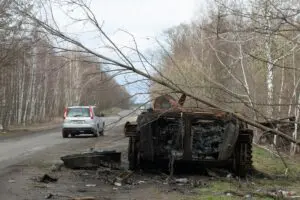What Is Fault?
Fault is when an entity intentionally or negligently fails to act reasonably, according to legal standards or one’s duty, resulting in harm to another person. This failure can arise from various factors such as ignorance, carelessness, negligence, or a lack of skill. If actions like not being aware, not taking proper precautions, disregarding others, or lacking necessary skills lead to injury to another person, they can all be considered as fault.
Legal scholar John C. Jeffries Jr. states, “Fault is the linchpin of tort liability.” Fault plays a crucial role in various aspects of law, including tort law (civil wrongs), contract disputes, and criminal law. Establishing fault is essential in legal proceedings to determine liability and to assess damages or penalties accordingly.
Fault forms the basis for legal liability and compensation. For example, in a car accident case, fault may be assigned based on factors like speeding, failure to yield, or distracted driving. For plaintiffs seeking damages, proving fault is essential to demonstrate that the defendant’s actions or negligence directly caused their injuries or losses. Conversely, defendants may argue mitigating circumstances or lack of fault to defend against legal claims.
More information about Fault
The Importance of Gathering Evidence in a Personal Injury Lawsuit
When filing a personal injury lawsuit after an accident, gathering comprehensive evidence strengthens your position and can significantly impact your compensation. While collecting evidence might seem overwhelming, an experienced personal injury attorney can guide this process, ensuring no critical details are overlooked. Multiple expert opinions and diverse forms of evidence enhance your case and help establish the facts.
Key Types of Evidence and How Your Attorney Can Help
Photographs and Video Evidence
 Visual documentation from cell phones or cameras often provides the clearest evidence of liability. These raw, unaltered records help insurance adjusters and attorneys understand what occurred during the incident. Your attorney will know what details need photographic documentation. The immediate accident damage provides only part of the story. Environmental conditions can impact liability significantly. Road conditions may have contributed to the incident. Weather circumstances often play a role. […]
Visual documentation from cell phones or cameras often provides the clearest evidence of liability. These raw, unaltered records help insurance adjusters and attorneys understand what occurred during the incident. Your attorney will know what details need photographic documentation. The immediate accident damage provides only part of the story. Environmental conditions can impact liability significantly. Road conditions may have contributed to the incident. Weather circumstances often play a role. […]
More information about Fault
Personal Injury Claims: What to Expect
Getting hurt in an accident can turn your life upside down. Understanding how personal injury claims work will help you get the compensation you deserve while focusing on your recovery.
How Long Do Most Personal Injury Claims Take?
Most personal injury claims take four to 12 months to wrap up, though some cases might need more time. The timeline depends on how serious your injuries are, who was at fault, and whether the insurance company works with you or against you. If your case goes to court, it could take longer than if you settle outside court.
It’s smart to wait until your doctors say you’re as recovered as you’re going to get before settling. This way, you’ll know what your long-term medical needs and costs will be.
How Does the Claims Process Work?
The personal injury claims process is straightforward – […]
Read MoreMore information about Fault
What Is a Bobtailing Truck?

A bobtail truck is a semi-truck driving without its trailer attached – a sight you may have encountered on highways and roads. While these trucks might appear more manageable and safer without trailers, this configuration introduces unique hazards. Semi-trucks are specifically engineered to haul heavy loads, and when operating without a trailer, their weight distribution and handling characteristics change significantly, creating unexpected dangers. The Federal Motor Carrier Safety Administration (FMCSA) reports that bobtail trucks account for approximately 5% of annual truck accidents. Despite their smaller profile, these vehicles can still cause devastating injuries in collisions, which is why accident victims often require the expertise of a truck accident law expert.
If you have been injured by a bobtailing truck, you need a skilled truck accident lawyer.
Bobtail Trucks in Commercial Transportation
The term bobtail truck refers to a truck, […]
Read MoreMore information about Fault
How Are Medical Bills Paid After a Car Accident in Bensalem?
 If you’ve been involved in a car accident in Bensalem, Pennsylvania, you may be facing not only physical and emotional challenges but also the daunting prospect of dealing with medical bills. In such a stressful time, understanding how medical bills are paid can provide you with valuable information and peace of mind. At Munley Law Personal Injury Attorneys, our Bensalem car accident lawyers have extensive experience in helping car accident victims in Bensalem and the surrounding areas navigate the complex process of medical bill payment.
If you’ve been involved in a car accident in Bensalem, Pennsylvania, you may be facing not only physical and emotional challenges but also the daunting prospect of dealing with medical bills. In such a stressful time, understanding how medical bills are paid can provide you with valuable information and peace of mind. At Munley Law Personal Injury Attorneys, our Bensalem car accident lawyers have extensive experience in helping car accident victims in Bensalem and the surrounding areas navigate the complex process of medical bill payment.
Insurance Coverage for Medical Bills
One of the primary sources of payment for medical bills after a car accident is insurance coverage. In Pennsylvania, drivers are required to carry a minimum amount of auto insurance, which includes:
Medical Benefits (Med Pay)
Medical Benefits, often referred to as Med Pay, is an optional but highly recommended type of auto insurance coverage for drivers in Pennsylvania. […]
Read MoreMore information about Fault
What If Road Debris Causes Your Car Accident?
When debris flies from a vehicle and onto the road, all other drivers are at risk of being injured in road debris accidents. Perhaps you were injured in such an accident because of unsecured loads or another form of negligence. Now, you may be facing medical expenses, lost income, and a range of other struggles.
You deserve compensation if someone’s negligence caused a road debris crash. However, it’s important to consider how the process of seeking compensation in these circumstances may be unique when compared to other personal injury cases.
Understanding Road Debris Accidents
Road debris can take many forms. The following are common types of road debris that could potentially cause accidents:
- Cargo that has fallen from trucks
- Fallen trees and large tree limbs that have fallen to the ground
- Debris from a previous collision
- Tires
- Broken glass
- Litter
- Rocks
- Garbage
Don’t underestimate how dangerous road debris can put drivers at risk. […]
Read More








